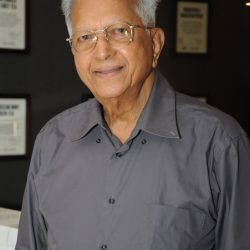Around the world, 70,000 cups of tea are consumed every second, but demand has commoditised the industry. On a mission to help people re-discover tea, Merrill and Dilhan Fernando are putting producers back in the driving seat and educating the hospitality industry on the science behind the perfect brew. Words by Melanie Mingas.

Those who drink tea know of its healing properties – from reducing stress to forging friendships – it is even claimed the high concentration of antioxidants can have epigenetic properties.
In China, where it is believed tea was invented 5,000 years ago, different teas are brewed and served in different vessels to enhance the flavour, aroma and delicate nuances of each taste. In India, where much of the world’s tea is produced and consumed, local tea makers, known as chai wallahs, serve spice infused brews on the street. In the United Kingdom, a country where more than 60 billion cups are enjoyed each year, it is prepared with milk and sugar and guzzled at any time of the day and night.
Yet, due to the pressures of meeting global demand, tea has become a toxic industry with far fewer healing properties. Since the 1800s, mass production has been necessary to achieve the economies of scale that first propelled the drink beyond the elite circles of aristocracy and royalty. However, this has slowly consolidated the industry, with only a handful of major companies accounting for more than 80% of the global tea trade.
To achieve the low price per bag, farmers are squeezed to produce high yields for low returns. According to a report led by Oxfam and the Ethical Tea Partnership, tea pickers in Assam, India, earn $1.30 day. The legal minimum daily wage for an unskilled worker in Assam is $2.64. Similar figures were report from other major tea producing nations.
Ceylon tea, known as some of the finest in the world, is native to Sri Lanka, formerly Ceylon, where tea production contributes around 2% of GDP. The first official tea estate was established in 1872, with the first public tea auction held in Colombo in 1883. The industry boomed and, by 1965, Ceylon was the world’s largest tea producer, but the money didn’t follow.
In the 1950s, Merrill J Fernando was recruited as a taster by British estate owners, making him one of the first Ceylonese to learn the art. Working on the tea estates, he was expose to the harsh realities of the local industry – the back-breaking work, the long hours and, in many cases, no pay. He vowed to change it, and four decades later, Merrill launched his own tea company, Dilmah, the first brand of tea, coffee or cocoa owned by its producers. Named after his sons Dilhan and Malik, the brand remains in the family to this day with Dilhan in the role of CEO and all tea still ethically sourced.
Merrill says: “Even though tea is the healthiest and most consumed beverage in the world after water, it has become a commodity in the hands of two or three international traders, who work only for profit.
“This is the trouble with the industry. Their only concern is with profit – and how do you get extra profit? By squeezing the producer. The trouble with the industry is that there is nobody who is really aware of the pain of farmers and workers.”
Merrill is considered the world’s most experienced teamaker. He has pioneered the concept of single origin tea since 1988, when Dilmah bucked industry trends to declare its commitment to authenticity, quality, variety and, above all, ethical tea production.
At the age of 87, Merrill continues his mission to ensure Dilmah’s business is dedicated to human service, with all profits retained in Sri Lanka and shared among workers. By essentially eliminating the middleman, Dilmah delivers a better quality product with a higher profit margin for those at the source.
Merrill explains: “The fact is, none of the people running those large tea companies visit the tea plantations – they are traders, they don’t know what is happening there. So, mine is a loan voice, but people are beginning to listen.
“I have given 66 years of my life just to fight the cause of exploited farmers. At Dilmah, we have de-commoditised tea, lifting its image, improving its goodness and bringing a better price to the producers.”
Despite this, Merrill rejects Fairtrade the label. His movement gained pace as Fairtrade started to educate the west on exactly how the profit from certain items dwindles through the supply chain, yet he was ahead of the curve. With Merrill previously referring to the label as “marketing spin”, Dilmah’s official response to why it doesn’t carry “Fairtrade” status, is because the movement “fails to address the industry’s fundamental weakness”.

The success of Merrill’s business model has enabled him to cascade support to the wider community through the MJF Charitable Foundation, established 2003. Today Merrill is recognised as a philanthropist across the business world, with the trophy cabinet to match.
MJF donates a minimum of 10% of all Dilmah’s pre-tax profits to fund projects in nutrition, education, care and support to differently abled children, youth and elderly people. In 2007, Merrill also established Dilmah Conservation, an organisation that extends the work of MJF to deliver positive environmental and cultural interventions.
He says: “When you buy our tea it’s money well spent. The money goes back to the country and every sip of tea brings hope to the workers, farmers and their families and children and we hope to leave this a better world. That is my passion.”
Quali-tea crusade
Single origin tea is described as a revelatory taste experience, with all leaves picked from the same estate to capture and enhance the garden’s unique tastes. In the case of Dilmah teas, only the first two leaves are picked from the plant – vibrant, tender and with the highest concentration of antioxidants – to ensure a light, smooth flavour.
The quality indicators in single estate tea echo many of those used to grade grape beverages, from terroir to intensity, and the soil condition, heat and humidity of an estate all have bearing on the crop. It’s a serious business.
Dilhan explains: “Within Sri Lanka, on a relatively small island you have terroirs and micro terroirs in different valleys. For example, in the east, there are certain intensities and exposures to light. Further north in the valleys, there is greater exposure to wind so the plant photosynthesis is different. Then, at the bottom of the valley it is shaded. What this means is that you are presenting nature in a very unique way.”
However, to achieve its cost efficiencies, industry-produced tea is blended, changing the composition of the flavour. Observing this, Dilmah isn’t just on a mission to reverse the impact of commoditisation on farmers, the company is also on a mission to reverse a global decline in quality.
Marking 30 years in the business in 2018, Dilmah has launched a Silver Jubilee Gourmet range, first announced five years ago. Adopting the same handpicked approach, the range includes Blood Orange and Eucalyptus, Mandarin and Marzipan Pekoe and Pure Darjeeling Singe Region Tea.
Dilhan continues: “Each cup of tea has about 13 hand picked leaves and buds, which means the art of the tea picker and the quality of their work reflects on your experience. If they have taken too much stem – the third or fourth leaf – you get bitterness.
“The art of the tea picker is critical because it expresses nature. We call ourselves tea makers, but nothing we do will change now nature created the leaf, we just select the best part. When you look at a single region or single estate tea, as these are, you will find that it represents the unique geography and climate of the area.”
The anniversary range is only the latest step in the plan. At the end of 2017, the Dilmah tea lounge debuted in the Middle East, at the Pullman Dubai Creek City Centre, with a menu incorporating the principles of Tea Gastronomy and Tea Mixology, along with food pairing.
Explaining the guest experience, Dilhan says: “We want people to reconnect with what tea really is. During afternoon tea here, you will enjoy various dishes that our chef produces and they are paired with different teas. Taking that into gastronomy, goes beyond natural luxury because tea can dignify food in a very special way. When you finish your meal, tea emulsifies fat and helps digestion. Tea also helps the body process sugars so after crème brulee it resets the balance of sugars and keeps you feeling good. We have signature chai, different mocktails, all designed to respect tea as a core ingredient.”
Elsewhere, Dilmah’s School of Tea, takes the message of quality behind the scenes to the hospitality industry. Dilhan adds: “We help professionals understand what tea is really about –the influence of terroirs, nature and the health benefits. Then, when you take that to mixology and gastronomy, it really takes things to the next level. You can use tea as a jus, marinade, to lighten or smoke flavours. People talk about superfoods and, if you prepare tea properly, it has 10 times the antioxidants per serving of broccoli. It’s a serious health beverage”
Regardless of the audience, the message is clear: single estate, guilt-free Ceylon tea, has the power to cure many problems. As Dilhan concludes: “We want people to reconnect with what tea really is. If you really consider what tea offers – not only is it uniquely healthy due to the natural goodness and antioxidants, tea is an affordable luxury. You can drink it at home for a few cents per cup, you don’t need another 50% off. Whatever the brand is, to deliver that saving, they cannot use the same harvest techniques, sustainable agriculture and biological containment, that we do. Our investment is in the quality.”


































































